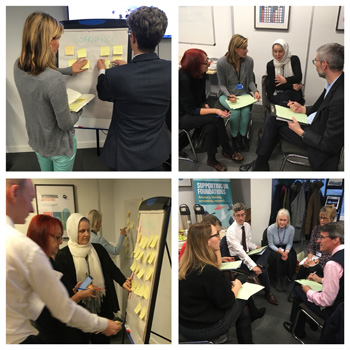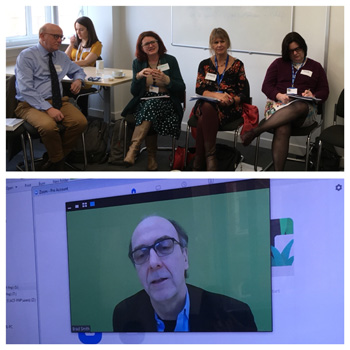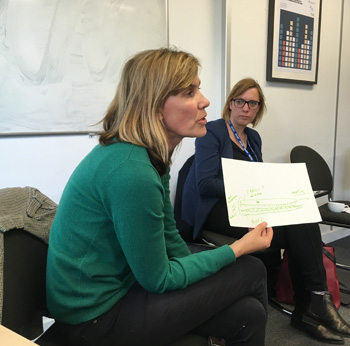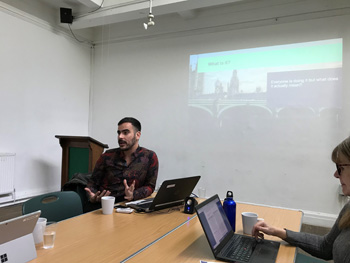Strategy and governance
View the report's launch webinar, with working group co-chair Jo Wells and Getting on Board's Penny Wilson.
Strategy and Governance was one of the six Stronger Foundations working groups. Its principal purpose was to examine, discuss and debate challenging questions about foundation practice related to its theme. On this page you can find snapshots of each meeting held, including content, reading materials and outputs.
The final report is available to view and download.
The group's work contributed significantly to the raw material gathered through the initiative as a whole, from which ACF will create a variety of products, including a 'rapporteur's report' summarising the breadth of discussions and evidence gathered.
The group was comprised of senior foundation representatives drawn from across ACF's membership, who met 7 times over an 18 month period. The meetings, which varied in format depending on the topic and desired content, included presentation of evidence (by experts from within and beyond the foundation sector), small group discussions, whole group exercises and visits.
The group's full terms of reference is available to view and download.
The members of the group were:
Jerry Wright, Wates Family Charities (group chair); Sheila Jane Malley, trustee of Co-op Foundation and Rosa (and ACF trustee); Steph Taylor, Charities Aid Foundation; Ellie Stout, Rothschild Foundation; Tina Gwynne-Evans, Bupa UK Foundation; Sara van der Pas, Wellcome Trust; Jo Wells, Blagrave Trust; Emily Harrison, Asda Foundation; John McCrohan, Masonic Charitable Foundation; Cherry Bushell, Wakefield and Tetley Trust; Quentin Elston, Mr.Willats' Charity; Lucy Bushill-Matthews, National Zakat Foundation; Pierre M Espinasse, The Kennedy Trust for Rheumatology Research; Debbie Lye, Spirit of 2012 Trust; Katie Le Quesne, chair of Lloyds Bank Foundation for the Channel Islands
Meeting Snapshots
Meeting #1 (December 2018) - Introduction meeting
The group held its first meeting, exploring the many ways that strategy and governance can be interpreted in a foundation context. Charity governance has been an issue in the spotlight in recent years.

Many foundations are increasing their efforts to strengthen the resilience of the boards of charities they fund, and considering how their own governance structures can deliver best practice and demonstrate their missions.
The foundation sector is comprised of members with a huge variety of governance structures. These include boards mostly or entirely comprised of members of the founder's family, staff from the private corporation that resources the foundation, and others with significant representation from the communities they serve.
When thinking about governance, the group highlighted the importance of regulatory compliance, having a blend of key skills and diversity, the relationship to the staff team, the role of power, investment decisions, and the setting of strategy.
The group considered how strategy can be both informed by the governance of the foundation, and determine how the board is recruited, comprised and operated. Its strategy can be a way to communicate the foundation's mission and set out its goals, as well as provide a mechanism for the foundation to be held to account. It can enable a foundation to be proactive, as well as be better prepared for responsive action.
Following this meeting, ACF will work with the group's chair, Jerry Wright (Director of the Wates Family Charities), to develop a work programme for the group, and engage with potential external contributors, including grantees, academic and practitioner experts and critical friends.
Meeting #2 (February 2019) - Stick or twist?
The group’s second session looked at the merits and limitations of long-term strategies. For how long should a foundation pursue a long-term strategy? How can it identify that it might be the right time to stop or change course? How can it remain agile and open to unexpected opportunities?

Brad K Smith, President of the US-based Foundation Center, joined via video link to share his observations of how foundation strategies have played out in the USA.
Brad recently wrote a provocative piece about how conservative foundations have had a significant impact in the USA by providing long-term unrestricted funding for organisations that share their beliefs; their efforts culminated in the appointment of Brett Kavanaugh as a Supreme Court Judge, whose influence could shape US foundations for decades to come.
Brad also posited that collaboration is hindered by foundations sticking to their strategies, which can often be rigid and inward-looking.
Sparked by Brad’s input, the group had a lively discussion about the impact of the individual leaders, the importance of legacy, and the nuances of framing issues taking ideology into consideration. These factors, and others, can influence whether foundations focus more on the long-term or the short-term, or whether they can navigate a strategy that encompasses both consistency and flexibility.
The group identified a number of advantages for foundations and those they fund to taking a long-term strategy, such as it allows for expertise, mistakes, and collaboration. But there were also limitations, including the need (both regulatory and reputational) to demonstrate impact, the churn of staff and trustees, and the risks of it going wrong.
Ultimately, the group noted that one of the foundation model’s greatest assets is its ability to both stick and twist – to take the long view, supersede political and economic turbulence, invest in riskier long-shots and to be live to emergent opportunities, flexible in delivery, responsive to critique and ready to change.
Meeting #3 (April 2019) – What comes first, strategy or governance?
This meeting considered the question ‘Does strategy lead your governance or does your governance lead your strategy?
Penny Wilson, CEO of Getting on Board, shared her perspective with the group. Penny presented trends and issues on governance, for example the limitations of recruitment platforms and the possible misguided approach to trustee skills, before directly addressing the question framing the session.
What comes first, strategy or governance? Penny responded that strategy comes first, and that governance is an effective tool to support and implement that strategy.
Penny posed a series of questions to the group, including:
- Are you comfortable that you have the right expertise on your Board?
- Is it ok for foundations to be different cases?
- Is there a role for foundations to strengthen governance in the wider sector? What are the best ways for foundations to support grantees with governance challenges?
- Is it ok for foundations to advocate open trustee recruitment if they are not practising it themselves?

Penny’s presentation resonated with many, and several other issues came to light in the ensuing discussion.
Board culture, internal power dynamics, and the balance between strategy and compliance at board meetings were all issues that influenced how foundations approached their strategy and governance.
Having teased out some of the issues, group members were given time to explore their own answers to the question ‘what comes first, strategy or governance?’ through visual representations. The group then came together to share their visualisations, which range from boxes and arrows to centipedes and leaves.
Looking more specifically at different foundation contexts, the group divided considered the influence of the founder or donor over the direction of the foundation from the perspectives of family, corporate and publicly-funded foundations.
Emergent themes included the need to evolve over time, the distance between the foundation and the founder or donor’s other philanthropy, and the importance of values and purpose in guiding the foundation. There were also questions of accountability, choice and decision-making, with different implications for privately or publicly-funded foundations.
Meeting #4 (May 2019) - Accountability beyond compliance
The fourth meeting of the Strategy and Governance working group considered the topic of ‘accountability beyond compliance’. Accountability has been a key point of discussion in several of our working groups and is emerging as a cross-cutting theme. We were delighted to be joined by Amy Ross, Head of Learning and Strategy at Comic Relief and Mark Henderson, Director or Communications at the Wellcome Trust, who gave interesting and different perspectives on accountability.
To start the meeting, the group considered the broad question “what does accountability mean to you”? There were many and varied responses to this question but overall responses clustered around the concepts of honour, legitimacy, transparency and being answerable.
Through the course of the meeting, the group considered a range of questions:
- What are the additional accountabilities for different types of foundation?
- What should you be doing beyond legal compliance? Is there a moral imperative?
- Does your sense of accountability to these different stakeholder impacts upon your foundation behaviour? If so, how?
- What, if anything, does it mean to those stakeholders?
- What are the benefits of being accountable to certain stakeholders?
- Is it a good thing that some funders have a lack of accountability?
- How can independence affect behaviour and can it be used as a force for good? Can this be abused in any way?
In considering these questions the group made some reflections:
- There is a moral imperative to be accountable
- Foundations should be their own ‘harshest critic’ as a starting point for accountability (though it requires a change your mindset or culture to achieve it.)
- Foundations should consider the impact on our relationship with grantees
- Transparency is important e.g. in justifying decisions
- Foundations should undertake advocacy and tell society what the issues are.
- We are accountable to anyone who is interested in or has an interest in what we do.
- Demonstrating impact is an important aspect of demonstrating accountability.
- Accountability can drive collaboration and makes us accountable to other funders.
- We are accountable to history and need to think about timescales for change and long-term projects.
Meeting #5 (September 2019) - the external context: through the lens of 'power'
The working group met for their fifth meeting to consider ‘the external context: through the lens of power’. The group considered the questions: how do boards consider/engage with the external context (including issues such as climate change as well as the communities with whom they engage)? How does this engagement inform strategy?
We were joined by two inspiring speakers, Paula Harriott, Head of Prisoner Involvement at the Prison Reform Trust, a champion of lived experience and a challenging voice in the sector around power dynamics, and Nicholas Ferguson, Founder of the Kilfinan Trust in Argyll and Bute, and previously chair of Sky and current chair of Savills.
While the Prison Reform Trust and Kilfinan Trust are very different in terms of their communities of interest, scale and geographical reach, both speakers emphasised the importance of working in partnership, putting communities of interest at the centre of their work, having those with lived experience in an organisation, investing time in understanding if and how the needs of communities of interest are represented, connecting boards with the purpose of an organisation.
After a very lively and broad Q&A with the speakers, the group moved on to consider the question, ‘how can trusts and foundations identify their blindspots’? A variety of ways to hear external perspectives was considered, from contracting evaluations to establishing a network of communities of interest to conducting ‘peer health checks’.
It was recognised that foundations could still be doing more, and even when external perspectives are sought, there are limits on the range of voices being heard and the extent to which those perspectives are given frankly and openly. But it takes time, complexity, and a supportive culture to engage well, as well as a need for some sort of ‘gold standard’ against which practice can be measured and assessed.
Returning to the central theme of power, it was noted that power can be a positive, for example in giving foundations credibility and confidence to speak out publicly. Often we focus on its negative connotations.
Meeting #6 (November 2019) - the board - whose expertise?
The sixth meeting of the Strategy and Governance working group looked through the lens of ‘power’ at the question: ‘whose expertise?’ The group particularly focused on the composition of boards and the value of different types of expertise, while exploring how current models of governance can be improved.
Members first considered how their own organisations interact with their boards. It was noted that each chair and each trustee is different, so the relationship between the board and organisation’s staff will significantly vary, as will the dynamic of the board. Despite variations, members agreed that a breadth of knowledge and perspective is important and that all trustees should have an active interest in the foundation’s work.
The group welcomed Bob Thust, co-founder of Practical Governance, a consultancy which provides governance support to organisations, networks, movements, and partnerships. Its mission is to implement ways of organising and making decisions that unleash social change. Bob stimulated discussion around models of governance by explaining that the predominant approach to governance prioritises risk aversion and self-preservation.
Bob introduced his concept of ‘permeable governance’, which looks beyond the board at different stakeholders and the governance roles or functions each of them can hold. He argued that expecting boards to carry out all functions sets them up for failure. Instead, power should be distributed between stakeholders so that good governance is practiced by the organisation as a whole.
The presentation sparked a debate around how distributing power might enable the board to possess both professional experience and lived experience. It was thought that taking on Bob’s concept of permeable governance could help organisations shift the composition of its board, particularly towards younger perspectives or local knowledge.
The group acknowledged that regular, free and equal communication between the board and SMT about strategy direction and decision-making processes, as well as a greater level of transparency between stakeholders is essential for good governance. Gathering feedback from grantees and unsuccessful applicants, as well as offering feedback in return, was particularly highlighted as important point of communication which should inform and influence governance.
While governance models will vary depending on the organisation, most trustees are volunteers who meet infrequently. The group recognised that boards often have too little time to reflect in depth on issues around governance and may find it easier to keep doing things the way they have always been done. The group therefore considered it especially important that the board creates a space for reflection, learning, and clarity around the culture of the organisation.
Meeting #7 (January 2020) – Horizon scanning
For its final meeting, the group's topic was ‘What does good horizon scanning look like and how does it inform our strategy and governance’?
 The group welcomed Lef Apostolakis, Communications Manager at the Parliamentary Office of Science and Technology (POST), as the speaker for this meeting. POST carries out horizon scanning on behalf of Parliament to inform policy.
The group welcomed Lef Apostolakis, Communications Manager at the Parliamentary Office of Science and Technology (POST), as the speaker for this meeting. POST carries out horizon scanning on behalf of Parliament to inform policy.
Lef talked about POST’s approach to horizon scanning, the evolution of the approach and recent horizon scanning reports, highlighting major themes that are used to frame their approach, including people (demographics), technological change, climate change, resource security and sustainability, inequality, and governance issues (building on its 2015 report ‘Towards 2020 and Beyond’).
Following Lef’s presentation, the group observed that POST relies on ‘trusted experts’, and foundations need to ask: who are our ‘trusted experts’? We all have multiple relationships with organisations working on the ground who are experts and don’t necessarily think of our grantees as ‘experts’ for the purpose of horizon scanning, but we should.
In terms of funding others, small charities don’t always have the capacity to do it, but unrestricted funding could enable them to use it to think strategically. One member asked whether foundations have a responsibility to fund grantees to do horizon scanning. Another group member asked whether foundations need to be impartial in their evidence gathering if we are trying to influence, and whether there are occasions when it is appropriate to be ideological.
The group then went on to consider what horizon scanning means for foundations and their strategy and governance, using several of the factors which POST considered in its research The group identified inclusivity and diversity and social cohesion as two further factors of relevance to foundations.
Members of the group considered how they might think about using horizon scanning information, whether that might be to identify a gap in provision or funding, new ways of doing things, how can we do things better, or identifying the next issues we need to address. Some felt that it is always useful to stand back and consider the external environment, but we often don’t spend as much time on this as we spend on delivering.
Working out how we have those conversations, be strategic and prioritise them feels very valuable and unlocks thinking about how we address needs. The world is changing around us and so we must not be hung up on current practice but be nimble and responsive.
The group agreed that enabling foundation boards to understand the importance of horizon scanning and how it can fuel our work and focus going forward is vital but can be a challenge. When boards have the opportunity to reflect in this way, they enjoy it and see the value of it.
Further reading
Below you will find a suggested reading list, which the working group identified and considered as part of its deliberations. If you would like to send suggestions to us, please do by emailing head of policy, Max Rutherford at: [email protected]